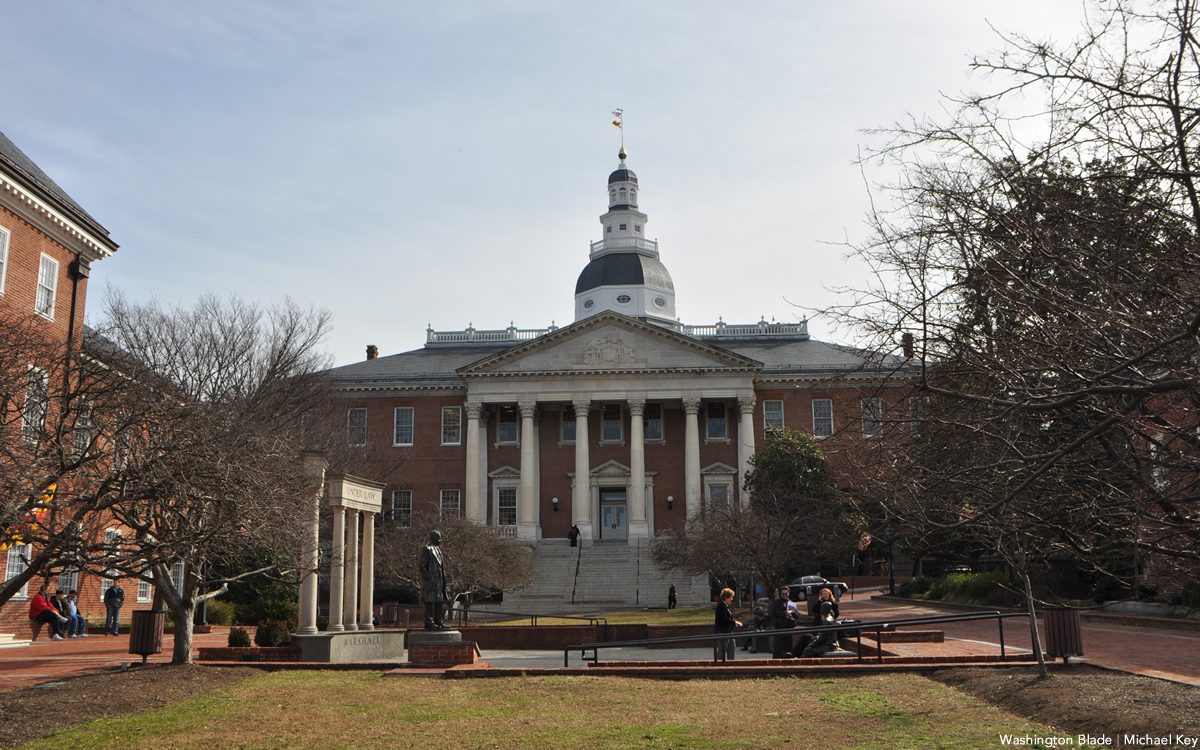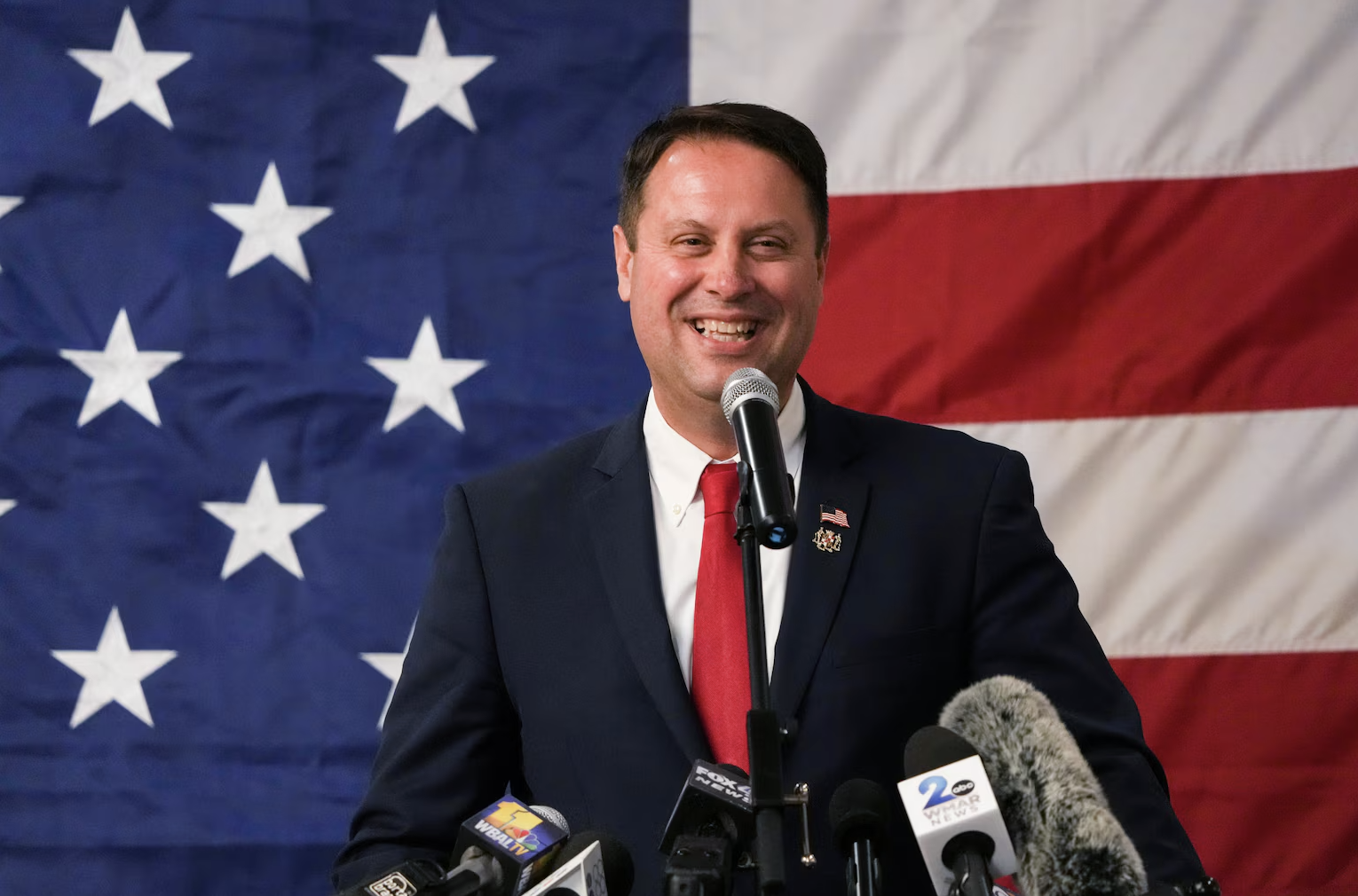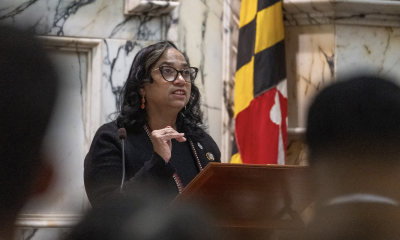Maryland
Md. General Assembly passes inclusive schools bill
Republican Gov. Larry Hogan has 30 days to sign HB 850

The Maryland General Assembly voted Monday to ban state-funded schools and county boards of education from discriminating against students on the basis of sexual orientation, gender identity race, nationality, disability, and other identity markers.
The House of Delegates passed the Inclusive Schools Act, also known as House Bill 850, by a 96-36 margin. It is now headed to Republican Gov. Larry Hogan’s desk and the governor has 30 days to either sign or veto the legislation. If he takes no action, the bill will take effect on July 1.
“After five years of introduction, me and [Sen. Cory McCray’s] prohibition on discrimination in schools has reached final passage,” said state Del. Jheanelle K. Wilkins (D-Montgomery County) in a Twitter post Monday evening.
Wilkins was one of the bill’s sponsors.
Should state-funded schools — pre-kindergarten, primary and secondary — and boards of education not adhere to nondiscrimination policies, they risk losing part of all their financing. The bill also prohibits retaliatory actions against students, parents and individuals who file complaints alleging discrimination.
“There is an important message in this legislation, as well, that taxpayer money should never fund those engaging in discrimination, bias, and hate,” said FreeState Justice Executive Director Jeremy LaMaster in an online press release Tuesday morning.
The Maryland State Department of Education will increase general fund expenditure by $42,100 in fiscal year 2023 to accommodate provisions for the bill, according to the bill’s fiscal and policy note.
The passing of the Inclusive Schools Act follows years of documented discrimination in schools around the state.
The Baltimore Sun reported in 2020 that Black students in the Carroll County Public Schools District were subjected to harassment that included being called racial slurs, bullied, caricatured when classmates asked to touch their hair, and being perceived as unsafe to be around.
“We all have to live by these certain rules and regulations in order to avoid the speculation [that] we’re doing something bad,” student Kelechukwu Ahulamibe told the Baltimore Sun, referring to the “rules of survival” his mother taught him to maneuver his surroundings.
Black people comprise 3.9 percent of the county’s population, according to Census data. This has translated into a lack of Black students in its school system that has left some feeling like outsiders in their community.
To remedy this, public schools in the area have created student cultural organizations where marginalized children and allies can congregate and support each other. The Carroll County Public School District also has an Equity and Inclusion Outreach program available for parents and students as a resource for educational programming and accountability.
Maryland
4th Circuit dismisses lawsuit against Montgomery County schools’ pronoun policy
Substitute teacher Kimberly Polk challenged regulation in 2024

A federal appeals court has ruled Montgomery County Public Schools did not violate a substitute teacher’s constitutional rights when it required her to use students’ preferred pronouns in the classroom.
The 4th U.S. Circuit Court of Appeals in a 2-1 decision it released on Jan. 28 ruled against Kimberly Polk.
The policy states that “all students have the right to be referred to by their identified name and/or pronoun.”
“School staff members should address students by the name and pronoun corresponding to the gender identity that is consistently asserted at school,” it reads. “Students are not required to change their permanent student records as described in the next section (e.g., obtain a court-ordered name and/or new birth certificate) as a prerequisite to being addressed by the name and pronoun that corresponds to their identified name. To the extent possible, and consistent with these guidelines, school personnel will make efforts to maintain the confidentiality of the student’s transgender status.”
The Washington Post reported Polk, who became a substitute teacher in Montgomery County in 2021, in November 2022 requested a “religious accommodation, claiming that the policy went against her ‘sincerely held religious beliefs,’ which are ‘based on her understanding of her Christian religion and the Holy Bible.’”
U.S. District Judge Deborah Boardman in January 2025 dismissed Polk’s lawsuit that she filed in federal court in Beltsville. Polk appealed the decision to the 4th Circuit.

By PAMELA WOOD | Dan Cox, a Republican who was resoundingly defeated by Democratic Gov. Wes Moore four years ago, has filed to run for governor again this year.
Cox’s candidacy was posted on the Maryland elections board website Friday; he did not immediately respond to an interview request.
Cox listed Rob Krop as his running mate for lieutenant governor.
The rest of this article can be found on the Baltimore Banner’s website.
Maryland
Expanded PrEP access among FreeState Justice’s 2026 legislative priorities
Maryland General Assembly opened on Jan. 14

FreeState Justice this week spoke with the Washington Blade about their priorities during this year’s legislative session in Annapolis that began on Jan. 14.
Ronnie L. Taylor, the group’s community director, on Wednesday said the organization continues to fight against discrimination against people with HIV/AIDS. FreeState Justice is specifically championing a bill in the General Assembly that would expand access to PrEP in Maryland.
Taylor said FreeState Justice is working with state Del. Ashanti Martinez (D-Prince George’s County) and state Sen. Clarence Lam (D-Arundel and Howard Counties) on a bill that would expand the “scope of practice for pharmacists in Maryland to distribute PrEP.” The measure does not have a title or a number, but FreeState Justice expects it will have both in the coming weeks.
FreeState Justice has long been involved in the fight to end the criminalization of HIV in the state.
Governor Wes Moore last year signed House Bill 39, which decriminalized HIV in Maryland.
The bill — the Carlton R. Smith Jr. HIV Modernization Act — is named after Carlton Smith, a long-time LGBTQ activist known as the “mayor” of Baltimore’s Mount Vernon neighborhood who died in 2024. FreeState Justice said Marylanders prosecuted under Maryland Health-General Code § 18-601.1 have already seen their convictions expunged.
Taylor said FreeState Justice will continue to “oppose anti anti-LGBTQ legislation” in the General Assembly. Their website later this week will publish a bill tracker.
The General Assembly’s legislative session is expected to end on April 13.
-

 Mexico5 days ago
Mexico5 days agoUS Embassy in Mexico issues shelter in place order for Puerto Vallarta
-

 Real Estate5 days ago
Real Estate5 days ago2026: prices, pace, and winter weather
-

 Theater5 days ago
Theater5 days agoJosé Zayas brings ‘The House of Bernarda Alba’ to GALA Hispanic Theatre
-

 Netherlands4 days ago
Netherlands4 days agoRob Jetten becomes first gay Dutch prime minister



















